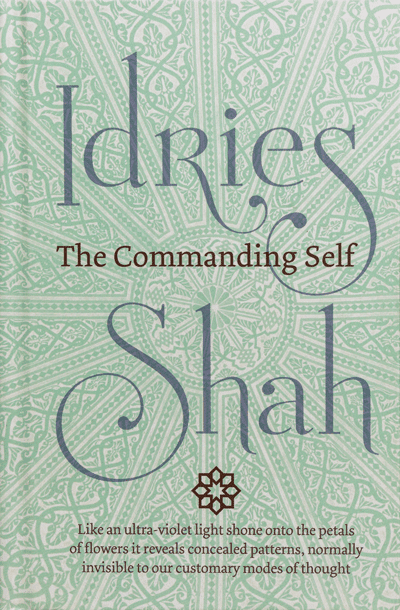‘The Commanding Self’ is the Sufi technical term for the false personality, that mixture of survival reflexes and conditioned responses common to all of us, which inhibit and distort human progress and understanding.
Idries Shah’s The Commanding Self is a collection of tales, anecdotes, letters, lectures, and question-and-answer sessions that highlight one of the fundamental barriers in the Sufi developmental process: the false self.
Upon the book’s publication, the author and Nobel prize winner Doris Lessing described this false personality as also ‘made up of what a culture puts into a person – parents, schools, the zeitgeist’.
Shah states that in genuine mystical traditions there is no intention of destroying or undermining the Commanding Self. Instead, would-be students are encouraged to ‘divert vanity from the spiritual arena ... to channel the Commanding Self’s activities to any worldly ambition: while continuing to study the Sufi Way in a modest and non-self-promoting manner’.
The Commanding Self enables readers to observe the functioning of their own emotional and conditioned responses. The book was described by Shah as the key to understanding his entire corpus of work.
BEING RUDE TO PEOPLE
Q: You sometimes seem to be very rude to people, and I have seen you take something someone has said and answer it in a way which did not seem to be intended by the questioner. Then, at other times, you seem to misunderstand what is being said. Another thing, why do you show vehemence and even intolerance? Surely calm and a reasonable attitude are essential if we are to examine things with an open mind?
A: There are lots of questions there, and questions within questions. To many people the assumptions upon which they are built will be immediately obvious. Let us run through some of them. The first, of course, is that the questioner can assess what is happening. The answer to that, in the words of the run-of-the-mill schoolmaster, is ‘If you could assess, madam, you would be sitting here, and not me.’ This remark immediately seems rude.
‘Rude’ is a difficult word. It implies that one has said something which is rough; or outside the accepted form for the group in which we find ourselves. It would be rude of a Sheikh not to offer you, as the guest of honour, a sheep’s eye at a feast. But if you handed a sheep’s eye to your guest at a genteel tea, it would be rude. You see the difference?
‘Cruel to be kind’ is another factor not to be forgotten. You slap the face of an hysteric, without thinking yourself ‘rude’; or apply rough artificial respiration to a drowning man. The genteel convention that these methods are not used in polite society does not apply on a different sort of occasion. One reason why polite society is unproductive of our sort of activity is that it is based on gentility made into an art.
Deliberately misunderstanding a person can be a ‘polite’ rebuke. If a person asks me ‘How many beans make five?’ and I reply about bean-soup, I am doing two things. First, I am politely ignoring the question. Secondly, I am supplying the information which is in some way associated with the question. If I happen to be teaching cookery, I will naturally talk about bean-soup.
The point about the answer not being in the sense intended by the questioner is important. It gets to the root of a problem. You see, a great many questions are ‘loaded’. That is, they are automatically intended to elicit a certain answer. This is an answer desired by the questioner. What kind of business are we in? Certainly not that of providing reassurance for people who could get it by mutual admiration, over a cup of tea.
The words ‘calm’ and ‘reasonable attitude’ are ‘loaded’. For example, you can only know what a reasonable attitude is and what calm is in relation to the situation.
Mulla Nasrudin points this out in his story about a number of stones in his earthenware jar. He counted hundreds but told a questioner that there were forty. ‘That is impossible!’ said the man. ‘If you only knew the truth,’ said Nasrudin, ‘you would know that not only did I not lie, but I even reduced the number.’
‘Temper the wind to the shorn lamb’ depends on how fierce that wind is, and how shorn the lamb is. Direct talk is a favour as well as an inconvenience.
From The Commanding Self by Idries Shah Copyright © The Estate of Idries Shah
Idries Shah was born in India in 1924 into an aristocratic Afghan family. He was an author and teacher in the Sufi tradition and is considered one of the leading thinkers of the 20th century.
Shah devoted his life to collecting, translating and adapting key works of Sufi classical literature for the needs of the West. Called by some 'practical philosophy' - these works represent centuries of Sufi and Islamic thought aimed at developing human potential. His best-known works include the seminal book The Sufis, several collections of teaching stories featuring the ‘wise fool’ Nasrudin, Reflections and Knowing How to Know.
Shah's corpus - over three dozen books on topics ranging from psychology and spirituality to travelogues and cultural studies - have been translated into two dozen languages and have sold millions of copies around the world. They are regarded as an important bridge between the cultures of East and West.
